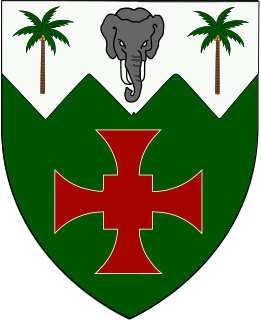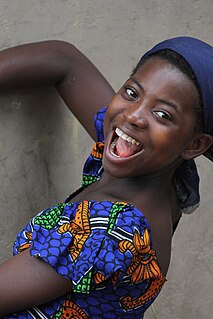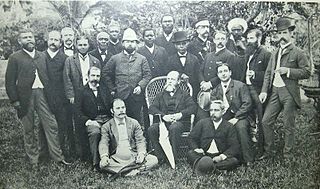Related Research Articles

Sierra Leone, officially the Republic of Sierra Leone, informally Salone, is a country on the southwest coast of West Africa. It is bordered by Liberia to the southeast and Guinea surrounds the northern half of the nation. Sierra Leone has a tropical climate with a diverse environment ranging from savanna to rainforests, a total area of 71,740 km2 (27,699 sq mi) and a population of 7,092,113 as of the 2015 census. The capital and largest city is Freetown. The country is divided into five administrative regions which are subdivided into 16 districts. Sierra Leone is a constitutional republic with a unicameral parliament and a directly elected president serving a five-year term with a maximum of two terms. The current president is Julius Maada Bio. Sierra Leone is a secular nation with the constitution providing for the separation of state and religion and freedom of conscience. Muslims make up about three-quarters of the population, though with an influential Christian minority. Religious tolerance in the West African nation is very high and is generally considered a norm and part of Sierra Leone's cultural identity.

Alhaji Ahmad Tejan Kabbah was a Sierra Leonean politician who served twice as the 3rd President of Sierra Leone, from 1996 to 1997 and again from 1998 to 2007. An economist and attorney by profession, Kabbah spent many years working for the United Nations Development Programme. He retired from the United Nations and returned to Sierra Leone in 1992.
Syl Cheney-Coker is a poet, novelist, and journalist from Freetown, Sierra Leone. Educated in the United States, he has a global sense of literary history, and has introduced styles and techniques from French and Latin American literatures to Sierra Leone. He has spent much of his life in exile from his native country, and has written extensively about the condition of exile and the view of Africa from an African abroad.

Fourah Bay College is a public university in the neighbourhood of Mount Aureol in Freetown, Sierra Leone. Founded on 18 February 1827, it is the first western-style university built in Sub-Saharan Africa and, furthermore, the first university-level institution in Africa. It is a constituent college of the University of Sierra Leone (USL) and was formerly affiliated with Durham University (1876–1967).
Njala University (NU) is a public university located in Njala and Bo, Sierra Leone. It is the second largest university in Sierra Leone and is also part of the University of Sierra Leone. The largest and main campus of Njala University is in Njala, Moyamba District; the other campus is Bo, the second largest city in sierra leone.

Davidson Sylvester Hector Willoughby Nicol or pen named Abioseh Nicol was a Sierra Leone Creole academic, diplomat, physician, writer and poet. He was able to secure degrees in the arts, science and commercial disciplines and he contributed to science, history, and literature. Nicol was the first African to graduate with first class honours from the University of Cambridge and he was also the first African elected as a fellow of a college of Cambridge University. Davidson Nicol also contributed to medical science when he was the first to analyse the breakdown of insulin in the human body, a discovery which was a breakthrough for the treatment of diabetes.

Ishmael Beah is a Sierra Leonean author and human rights activist who rose to fame with his acclaimed memoir, A Long Way Gone. His novel Radiance of Tomorrow was published in January 2014. His most recent novel Little Family was published in April 2020.

Adelaide Casely-Hayford, MBE, was a Sierra Leone Creole advocate, an activist of cultural nationalism, a teacher and fiction writer and a feminist. Committed to public service, she worked to improve the conditions of black men and women. As a pioneer of women's education in Sierra Leone, she played a key role in popularizing Pan-Africanist and feminist politics in the early 1900s. She set up a Girls' Vocational and Training School in Freetown in 1923 to instil cultural and racial pride for Sierra Leoneans under colonial rule. In pursuit of Sierra Leone national identity and cultural heritage, she created a sensation by wearing traditional African attire in 1925 to attend a reception in honour of the Prince of Wales.
Lamina Sankoh, born as Etheldred Nathaniel Jones, was a Sierra Leonean pre-independence politician, educator, banker and cleric. Sankoh is known most prominently for helping to found the Peoples Party in 1948, one of the first political parties in Sierra Leone. It eventually became the Sierra Leone People's Party.

Kadi Sesay is a Sierra Leonean politician, feminist, pro-democracy advocate and the vice presidential candididate of the Sierra Leone People's Party (SLPP). She served as Sierra Leone Minister of Trade and Industry from 2002 to 2007. She is the founder and Managing Director of Leone Consulting & Advisory Services – for Trade, Investment and Development. She is the mother of CNN International news anchor Isha Sesay.
Yulisa Amadu Pat Maddy was a Sierra Leonean writer, poet, actor, dancer, director and playwright. Known by his friends and colleagues as Pat Maddy or simply Prof, he had an "immense impact" on theatre in Sierra Leone, Nigeria and Zambia.

Gladys May Casely-HayfordaliasAquah Laluah was a Gold Coast-born Sierra Leonean writer. She is credited as the first author to write in the Krio language.

Sierra Leone, officially the Republic of Sierra Leone, is a Constitutional Republic in West Africa. Since it was founded in 1787, the women in Sierra Leone have been a major influence in the political and economic development of the nation.

Robert Smith FRCSE (1840–1885), also known as Bob Smith, was a Sierra Leonean medical doctor who served as Assistant Colonial Surgeon of Sierra Leone during the late nineteenth century. Smith was the first African to become a Fellow of the Royal College of Surgeons of Edinburgh after completing his medical studies at the University of Edinburgh.
Lucilda Hunter, née Caulker is a Sierra Leonean librarian, novelist and biographer who writes under the name Yema Lucilda Hunter.
Eustace Palmer is a Sierra Leonean professor, literary critic, and author.
Lemuel Adolphus Johnson, was a Sierra Leonean professor, poet, and writer who was based at the University of Michigan.
References
- ↑ "Dr. Eustace Palmer", Sierra Leonean Writers Series.
- ↑ "Crime Rhymes"}}
- ↑ The Dark Road From Romarong
- ↑ "The Sandmann's Journal Volume 1"
- ↑ "The Sandmann's Journal Volume 2"
- ↑ "The Sandmann's Journal Volume 3
- ↑ "The Sandmann's Journal Volume 4
- ↑ Worldpress
- ↑ Okonkwo, Rina. "Adelaide Casely Hayford Cultural Nationalist and Feminist", Phylon 42.1 (1981) : 41-51.
- ↑ "Gladys Hayford was Hrlem writing influence", African American Registry.
- ↑ "Cheney-Coker, Syl", Encyclopedia of World Literature in the 20th Century. 1999.
- ↑ "Sqn Ldr. Winston Forde", Sierra Leonean Writers Series.
- ↑ "Gbanabom Hallowell", Sierra Leonean Writers Series.
- ↑ World Economic Forum
- ↑ Ambrose Massaquoi, Sierra Leone Writers Series.
- ↑ "Lucilda Hunter", Sierra Leonean Writers Series.
- ↑ "Prof. Sheikh Umarr Kamarah", Sierra Leonean Writers Series.
- ↑ "Dr. Siaka Kroma", Sierra Leonean Writers Series.
- ↑ A Long Way Gone website.
- ↑ The Ishmael Beah Foundation Archived 2013-08-07 at the Wayback Machine
- ↑ Welch, C. E. Review of Black Man's Grave: Letters from Sierra Leone, by Gary Stewart and John Amman. Choice 45.1 (2007) : 174.
- ↑ Kargbo, John Abdul. "Grey Literature: The Forgotten Collection in Academic Libraries in Sierra Leone." Information Development 21.2 (2005) : 146-151.
- ↑ "Prof. Joe A. D. Alie", Sierra Leonean Writers Series.
- ↑ "Prof. Osman A. Sankoh", Sierra Leonean Writers Series.
- ↑ Ibrahim, Aisha Fofana and Susan Shepler. "Introduction: Everyday Life in Postwar Sierra Leone." Africa Today 58.2 (2011) : 164-165.
- ↑ "Dr. Aisha Fofana Ibrahim", Sierra Leonean Writers Series.
- ↑ Gender, Peace and Security Research Hub Archived 2013-11-07 at archive.today
- ↑ PEN International
- ↑ CODE, We-Care Foundation, and PEN Sierra Leone.
- ↑ Sierra Express Media Archived 2013-11-13 at the Wayback Machine
- ↑ "Sierra Leone: Pen-Sl Celebrates 10th Anniversary", All Africa, 3 July 2013.